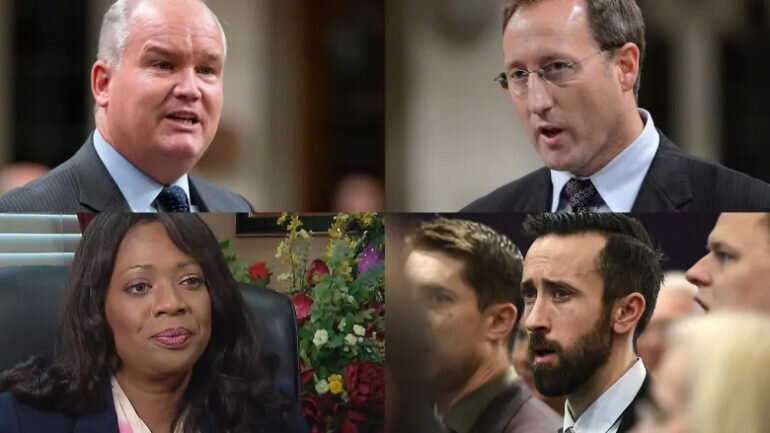Written By Guest User, Posted on July 2, 2020

A leadership debate is expected to occur July 8th with three of the four Conservative candidates participating. Due to the COVID-19 pandemic, the debate will be hosted online over the video conferencing service Zoom. Leslyn Lewis, Erin O’Toole and Derek Sloan have all accepted the invitation to the debate, although Peter MacKay will not be making an appearance. Sponsored by the Vancouver Centre Conservative Association on behalf of all 42 Electoral District Associations across British Columbia, the debate will concern the “top eight issues” of registered Conservative voters in that province. Three of these eight issues will be listed below, alongside the candidate’s stance on the issue in question. To get a more in-depth perspective on the candidate’s platform and the five issues not discussed in this brief piece, interested viewers can sign up to watch the B.C. debate on the Vancouver Center Conservatives website here.
The O’Toole’s environmental platform currently seeks to prohibit the dumping of raw sewage into rivers, to protect Canada’s wetlands (a source of carbon sequestration and biodiversity) by willing landowners, and to increase carbon sequestration in Canada through methods like improved forest management practices.
Both O’Toole and Lewis support more LNG projects to reduce reliance on coal, recognizing that Canadian oil and gas is significantly cleaner than foreign oil, which is produced with lower environmental and ethical standards. Lewis also supports diverting 100% of plastics from landfills, tax credit options for landowners who take the time to make their properties more environmentally friendly, and incentivizing businesses to find new green solutions.
Sloan has led the pushback against ‘climate alarmism’ by seeking to defund the World Wide Fund for Nature over the organization’s role in atrocities against people in the Democratic Republic of the Congo. He additionally supports defunding MakeWay, the Sierra Club, and the Climate Action Network, all of which Sloan claims “push hard for ‘solutions’ that are economically punishing to the average Canadian, and which do nothing but stunt economic opportunity for Canada.” Sloan is the only candidate that has promised to remove Canada from the Paris Agreement.
O’Toole has promised that the basic human right to clean drinking water will be guaranteed in every indigenous community under his leadership, as well as continuing the tradition of ‘nation-to-nation’ dialogues with First Nations and Inuit governments. Furthermore, O’Toole supports finding ways to enhance benefits indigenous communities receive through resource development (such as equity participation) and speeding up land claim settlements. In terms of creating new offices, O’Toole has promised to establish a corps of “RCMP Aboriginal Liaison Officers.” These specialized officers will be deployed to communities with a high number of missing or murdered indigenous women and will be tasked with both re-examining cold cases and other local issues. Lastly, O’Toole supports approaches to minimizing mental health problems and addiction in indigenous communities.
Much like O’Toole, Lewis has also supported ensuring all communities have access to clean drinking water and seeks to continue nation-to-nation talks. Lewis has particularly elevated the role of energy projects in elevating indigenous communities from poverty. However, her platform on indigenous issues remains small on her official campaign website, but is likely to be further expanded upon in July’s debate.
Sloan remains a unique case on indigenous issues. The only candidate to promise against the “the practice of signing on to UN treaties that undermine the legitimacy and authority of Canadian institutions,” Sloan has sworn to oppose the United Nations Declaration on the Rights of Indigenous Peoples (UNDRIP), purporting that UNDRIP misconstrues Canada’s existing Indigenous rights regime and “creates uncertainties that undermine Canada’s national economic interests…[and] will undermine First Nations communities seeking energy projects to bring prosperity to their communities.”
O’Toole has positioned himself to be a “true blue conservative” opposing cancel culture while “believ[ing] in the rule of law and freedom of speech, and defend[ing] the rights of Canadians.” Nevertheless, O’Toole was one 18 Conservative MPs who supported Bill C-279, which would have added self-declared “gender” as a protected identity in the Canadian Human Rights Act and Criminal Code—although it did not pass. This decision has recently come under criticism, as Bill C-16 (passed by Trudeau, adding both “gender identity” and “gender expression” to the Canadian Human Rights Act and Criminal Code), much like Bill C-279, bears implicit threats to free speech. In 2019, Canada’s oldest rape crisis centre was stripped of city funding for refusing to accept trans women due to the provisions of Bill C-279.
Lewis has led the charge against liberal bias in universities over Twitter, promising to fund them in a way where a standard is set whereby free speech and diversity of opinion is respected. Federal research funding will be withheld from those institutions that do not comply.
Free speech has been one of Sloan’s top discussion points. In addition to maintaining a policy akin to Lewis’ concerning restricting funding for universities that restrict freedom of speech, Sloan has also vowed to repeal Bill C-16 and to introduce laws against online censorship and algorithmic bias from tech giants like Google, Facebook, Twitter, and Youtube.
Hey there You have done a fantastic job I will certainly digg it and personally recommend to my friends Im…